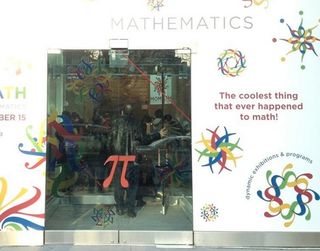I read something today that I wish I had written. So I am going to cross post it. This post comes from Noah Millman and it is about the lame textbook thing that Apple launched recently. With that intro, I'll shut up and let you read Noah. The original post is here. If anyone knows how to reach Noah, I'd like to email him and tell him how much I liked his post.
——————————————————————————————————–
I see that Steve Sailer and Matt Yglesias are both wondering why Apple’s iPad textbook initiative is so lame. Sailer wonders why Apple isn’t exploiting the interactive possibilities of the tablet to make textbooks much more effective. Yglesias wonders why Apple (or the Gates Foundation) don’t just give textbooks away for free, and thereby both increase the appeal of the tablet and reduce costs to hard-pressed school districts.
The answer is: Apple is a big company, and the Gates Foundation is a huge philanthropy. Large institutions are not the places to turn to, generally, for disruptive innovations.
Apple has no reason to go head-t0-head with textbook publishers, any more than it has any reason for going head-to-head with music labels or book publishers. It’s a much sounder business strategy for Apple to coopt these complementary businesses and make them dependent on Apple. Which is precisely the strategy that Apple has pursued.
The Gates Foundation is a somewhat more complicated story. In their case, I’d say the complementary relationship is between the foundation and the foundation’s clients – and their clients are education reformers, not education professionals. Simply giving textbooks away for free would upset an incumbent that the reformers are not particularly targeting, and would not put in place any structure for the creation of new textbooks. And incubating new products really is beyond the scope of what the foundation does.
Within the world of regular public school education, educational professionals have distinctly limited ability to express any kind of preferences – and the Bush-era education reforms have reduced this scope even further. The target market for textbook publishers is the politicians who set the curriculum for the nation’s largest school systems where that curriculum is set statewide: California and Texas. It matters very little what an individual teacher in Houston or Oakland wants or needs – or thinks their students need.
If you want to see disruptive change in the textbook market, then, you’d need to identify both a potential supplier of the product with no stake in propitiating the incumbents, and a buyer of the product for whom the product solves a problem.
My suspicion is that your best bet would be to have the supplier and the purchaser be, in some sense, the same entity. And I can think of two parts of the educational landscape where that situation might obtain: the KIPP network of high-performing charter schools and the home-schooling movement.
KIPP has the advantage of having a centralized structure and access to funding to implement a strategy. They already create their own curricula. Creating their own textbooks would be the logical next step. If the educational advantages Sailer sees as the potential in tablet-based study really exist, KIPP – which is already very data-driven in its approach to education – would be ideally placed to realize them. Similarly, if the cost advantages exist – initially, reduced spending on textbooks; over the longer term, reduced spending on teachers, as highly interactive tablets made it possible to stretch teachers over larger groups of students – KIPP actually has the incentive to realize these as well. One downside might be that KIPP would have an incentive to retain intellectual property in anything they created – but if it was successful, it would probably spur other charter networks to respond, and the smaller networks would be well-advised to work together rather than independently, simply for reasons of scale, and therefore to do something more open-sourced.
The home schooling movement, by contrast, has no access to funding nor any decision-making structure – but it has the advantage of having a much larger network of individuals potentially capable of committing resources to the project. One could imagine a Wikipedia-style process of textbook creation, where hundreds of thousands of home-schooling moms and dads donate a small portion of the time they already spend on teaching their kids to producing or editing material for the virtual textbooks they all use. You would, of course, need some kind of central structure to handle the programming – but even much of this could be relatively decentralized once the essential framework was in place.
Working either through the charter movement or the home schooling movement would enable a tablet textbook project to start small, yield immediate returns to participants, and scale easily, while largely ignoring the interests of incumbent institutions. And it wouldn’t require the sponsorship of an Apple or a Gates Foundation. Working through the regular public school system, which would certainly require some kind of megadollar sponsorship, would start big, would have to coopt the interests of incumbent institutions, and would make it difficult to impossible to actually yield quick returns to the most important participants: the teachers and students in the classroom. Which, unfortunately, has been the fate of all too many big-think reform proposals for the regular public schools. Much more sensible to build something in more natural laboratories for innovation, and then figure out how to “port” an already proven solution to the regular system.










